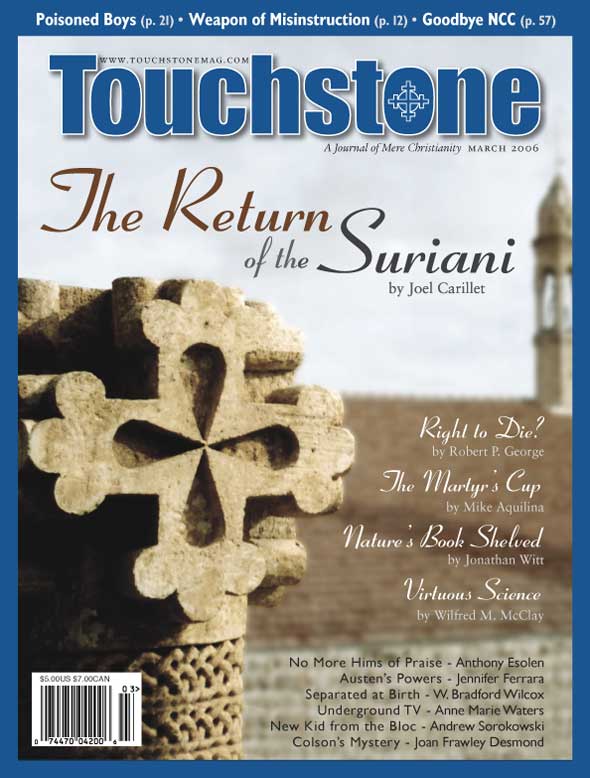Virtuous Science
The Grotesque Immodesty of the Humble Darwinist
There is no gentler and more humane exponent of the full-bore Darwinian understanding of nature than E. O. Wilson. Harvard Magazine published in its November–December 2005 issue a very useful précis of his philosophy, which also serves as an introduction to his latest book, From So Simple a Beginning: The Four Great Books of Charles Darwin.
This enormous volume gathers together Wilson’s preferred editions of what the Magazine’s editors, who are apparently unaware of the irony in their choice of words, refer to as Darwin’s most “iconic” and “foundational” texts. Wilson hopes this megatome will revive interest in reading what Darwin actually wrote. That is a worthy aim, particularly given the careful and fine-grained observation for which Darwin the naturalist will always be rightly celebrated, even if his quintessentially anti-iconic and anti-foundational theories remain a source of controversy.
I had the pleasure of sitting next to Professor Wilson at a dinner-and-discussion in his honor, held in 1998 in the beautiful old library of the Smithsonian “castle” building in Washington, just after the appearance of his book Consilience: The Unity of Knowledge. I was honored to make his acquaintance, and thought him one of the most delightful and sweet-natured gentlemen I’ve ever met.
If one were to take the measure of Darwinian orthodoxy strictly by his genial countenance and patient, humane demeanor, there would be no contest. And I well remember, and honor, the courage and steadfastness he showed earlier in his career, when he was viciously attacked by campus leftists who thought his sociobiological views racist, reactionary, and otherwise unworthy of the protections of academic freedom.
Evolutionary Conquest
That said, though, he was not very persuasive that evening, to me or to anyone else in the room. Nor is he very persuasive in this article, or anyplace else that he has cast his net into waters beyond his areas of unquestioned competence, particularly regarding questions of religion and psychology and history. This attractively modest man seemed to have become consumed with a grotesquely immodest goal. Not only did he seek to unify all knowledge, but he sought to do so in the same way that Alexander unified all the world—by acts of conquest.
Consilience was, in a word, an exercise in raw scientistic reductionism, which proposed to translate all other dimensions of human thought and experience into problems of evolutionary science, and ultimately, into questions of chemistry and physics. Such clumsy intellectual imperialism was too much even for the anti-religious (and pro-Darwinian) philosopher Richard Rorty, also present for the dinner, and Rorty made short work of Wilson in the discussion that day.
But Wilson is a stubborn man, and his anthem remains Science über Alles. In From So Simple a Beginning, he concentrates on an easier target, the pursuit of which is far less likely to attract friendly fire: religion. It need hardly be said that Wilson has nothing good to say about “intelligent design” theory, but he goes much further than that in the Harvard Magazine article. He insists that any effort to achieve rapprochement between science and religion is not only futile, but wholly undesirable.
Why? Because “there is something deep in religious belief that divides people and amplifies societal conflict,” and only a frankly atheistic form of “scientific humanism” is compatible with the way we now live, and capable of providing an “antidote” to the “toxic mix of religion and tribalism.”
One wonders how such an intelligent man could be satisfied with such simplistic bromides. To begin with, one might have thought, he would see that the assertion that religions are uniquely productive of social division might be open to the charge that it is, at best, an example of the logical fallacy post hoc ergo propter hoc, or perhaps a confusion of correlation with causation. One might also think that a man of science (particularly a sociobiologist, who believes in the biological functionality of cultural institutions) might have felt prompted to provide some empirical evidence for such an assertion. But no such luck.
Wilfred M. McClay holds the SunTrust Chair of Humanities at the University of Tennessee at Chattanooga, and is the author of The Masterless: Self and Society in Modern America (North Carolina) and A Student's Guide to U.S. History (ISI Books). He is a member of the Presbyterian Church, U.S.A.
subscription options
Order
Print/Online Subscription

Get six issues (one year) of Touchstone PLUS full online access including pdf downloads for only $39.95. That's only $3.34 per month!
Order
Online Only
Subscription

Get a one-year full-access subscription to the Touchstone online archives for only $19.95. That's only $1.66 per month!
bulk subscriptions
Order Touchstone subscriptions in bulk and save $10 per sub! Each subscription includes 6 issues of Touchstone plus full online access to touchstonemag.com—including archives, videos, and pdf downloads of recent issues for only $29.95 each! Great for churches or study groups.
Transactions will be processed on a secure server.
more on science from the online archives
more from the online archives
calling all readers
Please Donate
"There are magazines worth reading but few worth saving . . . Touchstone is just such a magazine."
—Alice von Hildebrand
"Here we do not concede one square millimeter of territory to falsehood, folly, contemporary sentimentality, or fashion. We speak the truth, and let God be our judge. . . . Touchstone is the one committedly Christian conservative journal."
—Anthony Esolen, Touchstone senior editor













